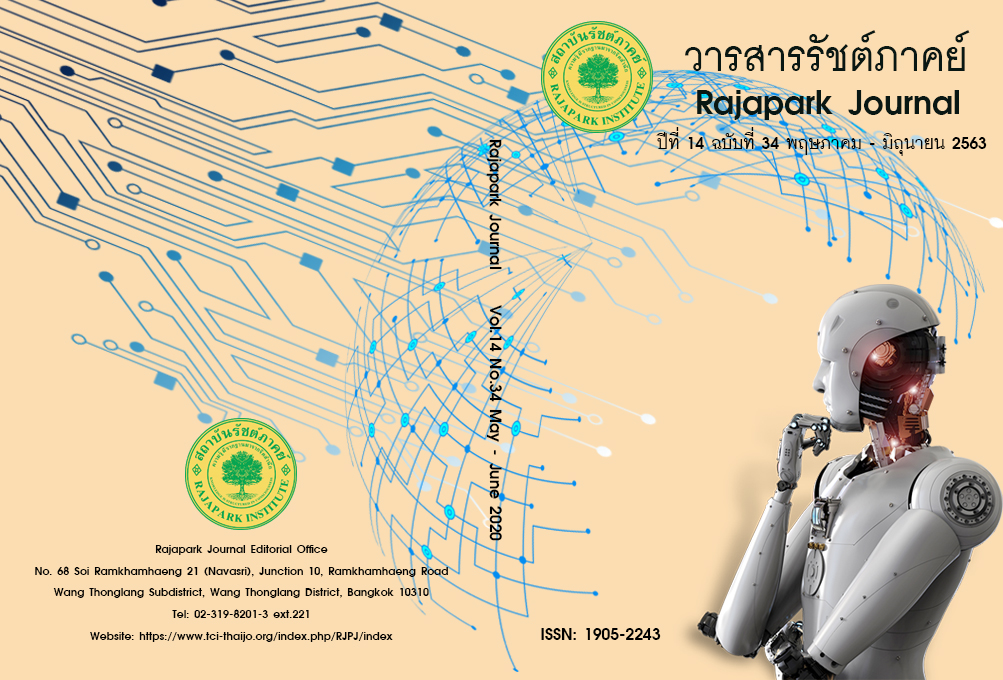Methods and Impact of Organizational Politics
Main Article Content
Abstract
This academic article aims to study politics in organizations. With aspects of methods and effects on the organization by studying from various researches both domestically and internationally found that the politics of the organization is a matter that can be seen in every organization, both government and private sectors and is often a matter of using power Influence within the organization which will have different forms and methods of politics whether it's an attack or to blame other people news control, visualization, creation of support bases establishment of alliances or political supporters, for example, the political methods used are both a matter of responding to personal interests It is about managing influence to achieve the set goals. Which is hoax dishonesty using power to negotiate benefits while the other side it's a matter of compromise? Coordinate the interests of different groups in an organization to resolve conflicts between different interest groups within the organization. In summary, politics in the organization has both benefits. And punishing people and organizations in the beneficial field, it will be good to understand human behavior in the organization and applied to bring good benefits to the organization However, politics is often used negatively. Waste a lot, therefore, this article will reflect methods and effects that may occur. From organization politics to control and apply politics in the organization to maximize benefits in operation makes it able to work more efficiently.
Article Details
Views and opinions appearing in the Journal it is the responsibility of the author of the article, and does not constitute the view and responsibility of the editorial team.
References
Bacharach, S. B. (2005). Politically proactive. Fast Company, 94(1), 93.
Bowonwattana, P. (2015). Public organization theory. Bangkok: Chulalongkorn University.
Cavanagh, Gerald, Dennis, J., Moberg and Velasquez M. (1981). The Eihics of Organizational
Politics. Academy of Manangement Review, 6(3), 363-74.
Chung, K. H., & Megginson, L. (1981). Organization behavior: Developing management skill. New
York: Harper & Harper.
Daft, R. L. (2001). Organization theory and design (7th ed.). Mason, OH: South-Western.
Dubrin, A. J. (1998). Leadership research findings, practice, and skills. Boston: Houghton Mifflin.
Ferris, G. R., & King, T. R. (1991). Politics in human resources decision: A walk on the dark side.
Organizational Dynamic, 20(2), 59-71.
Gandz, J., & Murray, V. (1980). The experience of workplace politics. Academy of Management
Journal, 23(1), 237-251.
Greenberg, J., & Baron, R. A. (2003). Behavior in organizations (8th ed.). Upper Saddle River, NJ:
Pearson Education.
Kakabadse, A. (1983). The Politics of Planned Change. Industrial Management & Information
Systems, 83(9/10), 10-14.
Karp, H. B. (1988). Avoiding political pitfalls. Management Solutions, 33(10), 9-13.
Lasswell, Harold D. & Abraham Kaplan. (1970). Power and Society. New Haven: Yale University press.
Lorsuwannarat, T. (2003). Modern organization theory (2nd ed.). Bangkok: Printing Augsorn.
Madison, D. L., Allen, R. W., Porter, L. W., Renwick, P. A., & Mayes, B. T. (1980). Organizational
politics: An exploration of managers’ perception. Human Relations, 33(2), 79-100.
Marasco, J. (2004). On politics in technical organizational. Retrieved October 10, 2019, from
http://www.128.ibm.com/developerworks/rational/library/4690.html
Mitchell, T. R., & Larson, J. R. (1987). People in organization: An introduction to organizational
behavior (2nd ed.). New York: McGraw-Hill.
Nelson, D. L., & Quick, J. C. (2006). Organizational behavior: Foundations, realities and challenges
(5th ed.). Mason, OH: South-Western.
Nimpanich, C. (2004). Leadership in power and politics in organizations. Nonthaburi: Sukhothai
Thammathirat Open University.
Pfeffer, J. (1981). Power in organizations. Marshfield, MA: Pitman.
Robbins, S. P. (2003). Organizational behavior (10th ed.). Englewood Cliffs, NJ: Prentice-Hall.
Schermerhorn, J. R., Hunt, J. G., & Osborn, R. N. (2000). Organization behavior (7th ed.). New
York: Von-Hoffman.
Thorn Suntharayuth. (2013). Organizational theory and behavior: research theory principles and
educational practices. Bangkok: Netikul Printing.
Tushman, M. L. (1997). Political approach to organizations: A review and a rational. Academy of
Management Review, 2(1), 206-217.
Valle, M. (2006). Individual determinants of organizational politics: Perceptions and actions.
Unpublished doctorate dissertation, Florida State University, Florida.
Vigoda, E. (2003). Developments in organizational politics: How political dynamics affect employee
performance in modern work sites. Cheltenham, UK: Edward Elgar.
Yulk, G., & Falbe, C. M. (1990). Influence tactics and objectives in upward, downward, and lateral
influence attempts. Journal of Applied Psychology, 75(1), 132-140.


